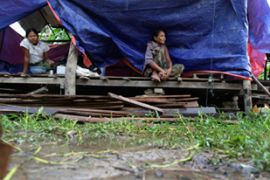Myanmar survivors ‘face debt trap’
Millions of cyclone survivors remain in need of help to rebuild their lives, charity says.

“One of our most important roles is helping disaster-affected populations to take part in securing their own future well-being,” said Bernd Schell, the head of the Red Cross country office in Myanmar.
Aid shortfall
| Cyclone Nargis |
|
|
A United Nations appeal launched after the cyclone is due to close on Friday, a day before the anniversary of the disaster.
But despite an initially generous response, Oxfam said only two-thirds of the funds needed have been received.
In particular, it said there was a $42m shortfall in funds needed to revive the region’s vital agricultural base.
Sarah Ireland, Oxfam’s regional director for Southeast Asia, said Nargis had caused “a level of destruction similar to the worst-hit areas of the 2004 Indian Ocean Tsunami”.
She said that survivors would need help for at least the next three years if they are to rebuild their lives to the levels before the cyclone.
The high winds whipped up by the cyclone resulted in sea water contaminating vital wells and turned almost two million acres of Myanmar’s most fertile rice paddies into salt-contaminated wastelands.
A recovery plan prepared by the UN, the Association of Southeast Asian Nations (Asean) and the Myanmar government has called for $690m to help rebuild livelihoods in the disaster region.
But aid groups say the international response to that appeal has been slow.
Oxfam says that without urgent funds, farming and fishing communities in the delta region will be unable to rebuild.
Harvest destroyed
 |
| About 240,000 people still do not have direct access to clean drinking water [Reuters] |
“One of the many impacts of Cyclone Nargis was that it destroyed almost an entire harvest that farmers and fishermen had already borrowed against before the cyclone hit,” Claire Light, Oxfam’s Myanmar country director, said in a statement.
“That has meant many families defaulted on those loans, and haven’t been able to access enough credit ever since to get back on their feet.”
Fishermen also lost boats and nets in the disaster, making it impossible to earn the money they need to repay outstanding loans, the charity said.
Unless more help arrives, families who depend on fishing and farming were likely to fall further into debt, sapping their ability to provide food for their families and help rebuild their lives, Oxfam said.
The military government that rules Myanmar was widely condemned for denying foreign aid agencies access to the affected area in the first weeks after the disaster.
However, the government is now working with the United Nations and Asean, and allows aid agencies, including Oxfam and Save the Children, to work in the country.
 Cyclone struck Myanmar’s Irrawaddy Delta region on the night of May 2, 2008, packing winds in excess of 200kmh
Cyclone struck Myanmar’s Irrawaddy Delta region on the night of May 2, 2008, packing winds in excess of 200kmh